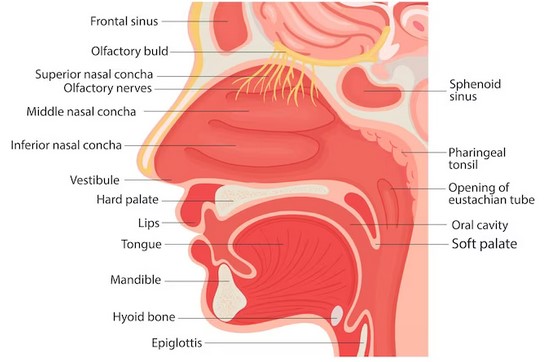After you start the swallowing process it should continue without any conscious thought.
When the involuntary phases of swallowing cease to happen automatically and reliably, resultant swallowing issue may require medical attention.
The process of swallowing involves four main phases:
Oral Preparation Phase:
This phase begins with the voluntary movement of food or liquid into the mouth. The tongue and jaw work together to manipulate the food and mix it with saliva, forming a cohesive bolus. The bolus is then pushed toward the back of the mouth by the tongue to initiate the swallowing process.
Oral Phase:
In this phase, the tongue pushes the bolus against the hard palate (the roof of the mouth), triggering a reflex known as the swallowing reflex. The swallowing reflex coordinates the closure of the nasal passages and the elevation of the soft palate to prevent food or liquid from entering the nasal cavity. The bolus is then propelled toward the back of the throat (pharynx).
Pharyngeal Phase:
This phase is an involuntary phase that occurs in the pharynx, a muscular tube connecting the mouth to the oesophagus. The swallowing reflex triggers the contraction of pharyngeal muscles, which propel the bolus further downward. During this phase, the epiglottis, a flap of tissue located at the base of the tongue, closes over the opening of the larynx (voice box) to prevent food or liquid from entering the airway. Additionally, the vocal cords close, and the muscles of the pharynx contract to push the bolus into the oesophagus.

Oesophageal Phase:
Once the bolus enters the oesophagus, it is propelled through a series of coordinated muscular contractions called peristalsis. Peristalsis moves the bolus downward toward the stomach. The lower oesophageal sphincter, a ring of muscles at the junction of the oesophagus and stomach, relaxes to allow the bolus to enter the stomach. This phase is also involuntary, and the bolus continues to move through the oesophagus without conscious effort.
It’s important to note that these phases of swallowing typically occur seamlessly and rapidly, allowing food and liquids to be transported from the mouth to the stomach.
Medical disorders such as neurological disorders as well as certain cancers and other conditions can affect the swallowing process.
If you have difficulties swallowing that it is important that you to consult your doctor to get the right advice on how to manage your medical condition.
